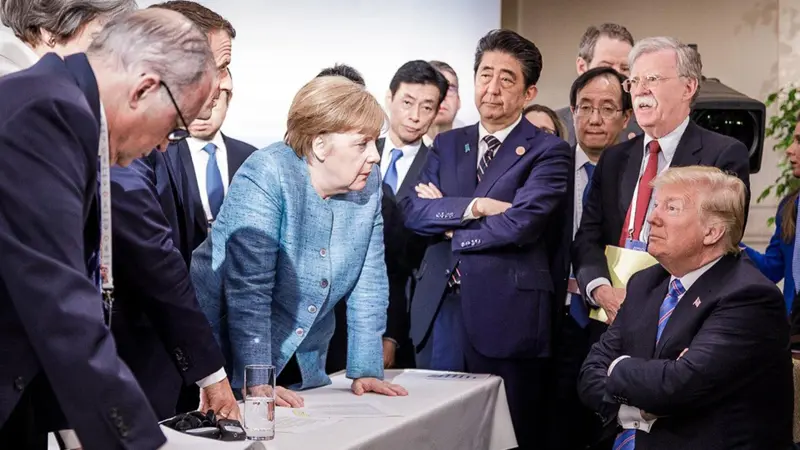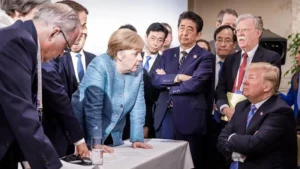Angela Merkel – How she drove an outstanding Country into the Abyss

16 years of Angela Merkel: The light and shadows of an era
Angela Merkel shaped Germany like no other politician of her generation. For 16 years, she steered the country’s destiny through ups and downs, crises and times of upheaval. But what is the balance sheet of her chancellorship?
Angela Merkel – Progress with obstacles:
Germany is lagging behind in terms of digitalization and infrastructure. The expansion of the fibre optic network is faltering and the digitalization of schools and public authorities is making slow progress. The dilapidated infrastructure – from roads and bridges to local public transport – is an investment backlog that is swallowing up billions.
Migration policy: challenges and opportunities:
Merkel’s decision to take in hundreds of thousands of refugees in 2015 was a humanitarian feat that also divided the country. The integration of refugees continues to present Germany with major challenges, but also offers opportunities for the future.
Bright spots and construction sites:
Merkel’s era was characterized by a stable economy, a high standard of living and a strong social safety net. She demonstrated pragmatism and determination in the euro crisis and the refugee crisis.
Points of criticism:
Critics criticize Merkel’s lack of vision and leadership. They criticize her reluctance to make decisions and her tendency to postpone problems.
Merkel’s chancellorship was a time of change and challenges. She leaves behind a country with light and shade, with construction sites and potential for the future.
Here are a few points that could be explored in greater depth in a critical article on Angela Merkel’s chancellorship:
Digitalization: the expansion of the fibre optic network, the digitalization of schools and public authorities and the promotion of innovations in the field of digitalization.
Infrastructure: The investment backlog in infrastructure and the need for sustainable financing.
Migration policy: The integration of refugees, combating the causes of flight and strengthening European cooperation in migration policy.
Other topics: The energy transition, climate change, social justice and the future of the European Union.
It is important to take stock of Angela Merkel’s chancellorship in a differentiated way. She was a formative figure in German politics who left both positive and negative marks.
Angela Merkel’s internal political battles
In addition to the challenges mentioned above, Merkel’s chancellorship was also characterized by internal political struggles.
Internal CDU struggle:
Within her own party, the CDU, Merkel repeatedly faced challenges from rivals such as Friedrich Merz and Wolfgang Schäuble. The rivalry with Merz came to a head in 2018 when he tried to prevent Merkel’s candidacy for the CDU chairmanship.
Torn by the refugee crisis:
The 2015 refugee crisis divided the CDU and German society. Merkel’s decision to open the borders to refugees met with massive resistance from parts of the party and the population.
Coalition partners as a challenge:
In her coalitions with the SPD, the Greens and the FDP, Merkel always had to negotiate compromises and find majorities for her policies. This did not always go smoothly, as the failed coalition negotiations with the FDP in 2017 showed.
Relationship with other politicians:
Merkel’s relationship with other politicians was characterized partly by cooperation and partly by competition. She maintained a close relationship of trust with her long-time companion Thomas de Maizière. Her relationship with other politicians such as Horst Seehofer and Sigmar Gabriel, on the other hand, was more distant.
Merkel’s role in the rise of the AfD (Official website)
Angela Merkel’s role in the rise of the AfD is complex and controversial. There are various factors that need to be taken into account:
Merkel’s refugee policy
Merkel’s decision to take in hundreds of thousands of refugees in 2015 was a turning point in German politics. The AfD used the population’s fears and concerns about immigration to strengthen its positions.
Style of government
Merkel’s reluctance to make decisions and her tendency to postpone problems were interpreted by the AfD as a sign of weakness and a lack of leadership.
The perception of the AfD in the media:
The AfD benefited from a strong media presence, which helped it achieve greater reach and popularity.
The division of society
The refugee crisis and other issues such as the euro crisis led to a split in German society. The AfD was able to use this division to mobilize its supporters.
It is difficult to say whether Merkel could have prevented the rise of the AfD. However, it is undeniable that her policies and style of government have played into the hands of the AfD.
An article on Merkel’s role in the rise of the AfD could explore the following points in more depth:





